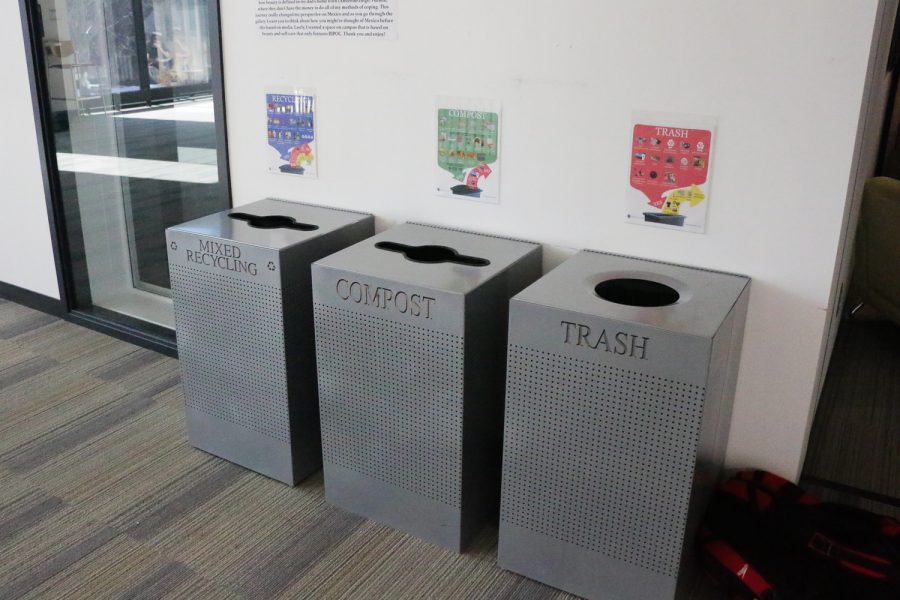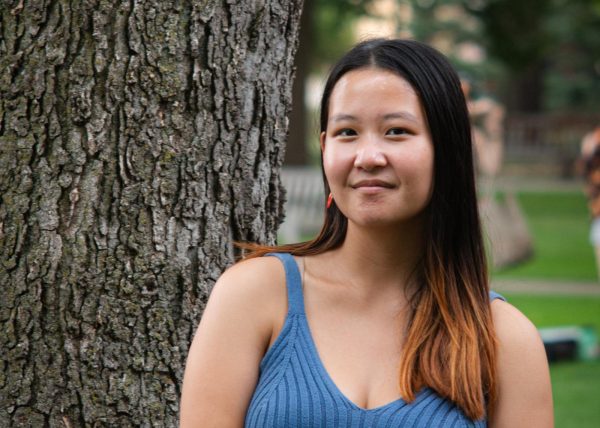Unseen activities: office of sustainability sorts waste
April 28, 2022
On March 11, the sustainability office underwent a waste sort in collaboration with Facilities Services. Director of Sustainability Christie Manning, Custodial Services Manager Karen Maxwell and sustainability student workers joined forces in the Wallace basement trash room to sort through bags of trash, compost and recycling from the Ruth Stricker Dayton Campus Center and Wallace Hall dorms.
The team uncovered an astonishing four pounds of compost that was missorted and would have otherwise gone to the landfill. This was out of 13 total pounds of compost, meaning that almost one-third of the compost they found was missorted. Additionally, 1.5 pounds of recycling was missorted and would also have been sent to the landfill had they not intervened. Finally, there was 3.5 pounds of missorted trash.
The missorted trash has significant implications. Any time bags of recycling or compost are contaminated with trash, there is the possibility that the entire bag will be thrown away, eliminating the possibility that the other correctly sorted items in the bag will be recycled or composted.
Manning said that she was shocked by the results of the waste sort. However, she acknowledged that others who work more closely with the custodial staff might have more knowledge regarding campus waste disposal norms.
“I had a custodian stop in my office late in the evening last week,” Manning said. “He said ‘you wouldn’t believe the things I’ve seen in the dorms. The things that students are throwing away and the things that they’re missorting. You’ve gotta do something.’”
Sustainability student worker Susanna Deal ’25 said that working in the sustainability office has made her see that small decisions that students make do end up having a significant impact.
“They really opened my eyes to certain aspects of sustainability that I hadn’t really considered,” Deal said. “[The Sustainability Office] also plays on interests of mine that I didn’t know sustainability related to, such as bicycles or the free swap.”
Deal was one of the students who attended the waste sort, and reported that she felt it increased her awareness of the importance of being aware of your actions when sorting waste.
Deal is one of two Post Action-Landfill Network fellows, along with fellow sustainability student worker Jeanarry Rodriguez ’24. The two are in the process of envisioning an ideal plan for zero waste at Macalester. This includes trying to find out what each department would need in terms of money, staff and time to implement their zero waste goal.
“I hope that we can convince [the administration] that [change] doesn’t have to be all at once,” Deal said. “Their job is to be realistic, but we don’t want them to see how much needs to change and immediately go ‘nope, we’ll never reach there.’”
Deal hopes that she and Rodriguez will be able to incorporate their vision into the master strategic plan, where it will be able to help determine the future of sustainability at Macalester.
Manning also reported that the sustainability office is working to ensure that the three types of waste bins are always present together, and also modifying the signs on the side of the bins to indicate to students what waste should be placed where.
Both Manning and Deal emphasized that dirty Training, the current training strategy for waste sorting that first-year students receive at the start of the year, is not sufficient. Manning hopes to implement dirty training for academic departments and on-campus offices. This was a project that Alyssa Erding, former sustainability coordinator, was working on before she left Macalester in November 2021, and Manning said she hopes that the new sustainability coordinator Ellen Gurrola will be able to continue it.
Deal said that she hopes to make the information in dirty training more accessible to students, and for the training to become yearly or even occur every semester, in order to remind students about what waste goes where.
Manning echoed this sentiment, stating that making proper waste sorting a norm and trying to help people to choose to do something on their own rather than forcing them is what the sustainability office wants to focus on.
“It’s all about making the changes, making the shifts where you can,” Manning said. “If we had even 75% of students with us on that, in terms of being careful what they buy and how they sort, we would easily be an order of magnitude better than other campuses in the country.”














Fluix • Sep 27, 2022 at 7:19 pm
To sort or not to sort garbage is a question that no longer arises today. Indeed, according to the World Bank, more than 2 billion tons of municipal waste is produced every year on our planet. By 2050, the amount of waste on the planet should increase by 70%. If we do not start sorting waste and reusing it today, then in a couple of years our planet will turn into one big dump “https://fluix.io/solutions-esigning“